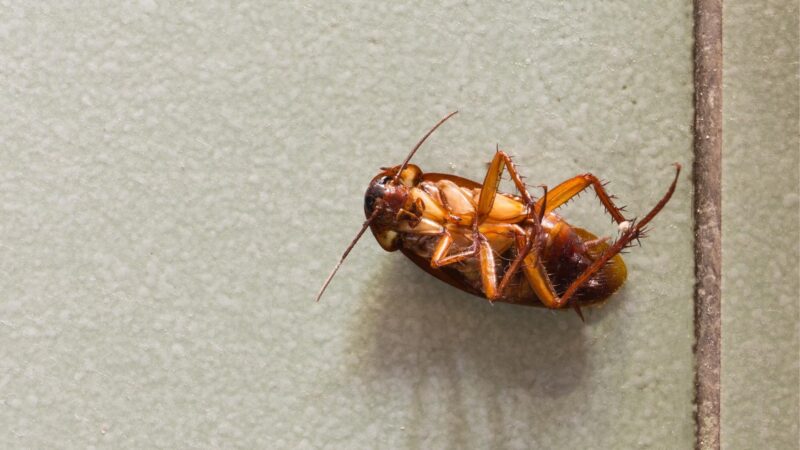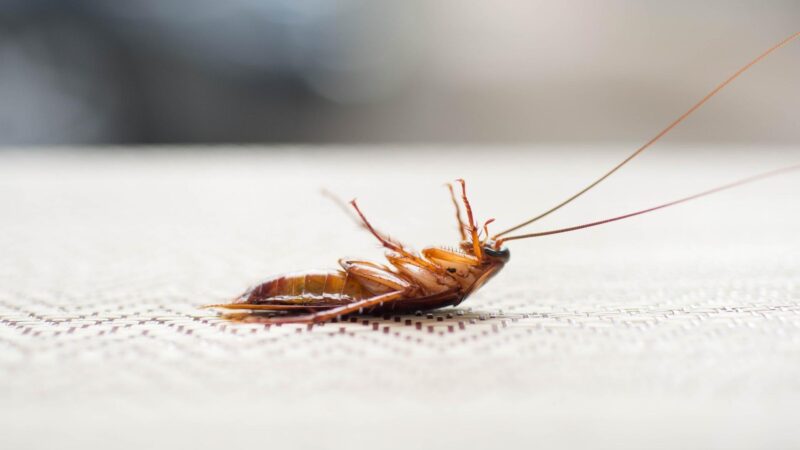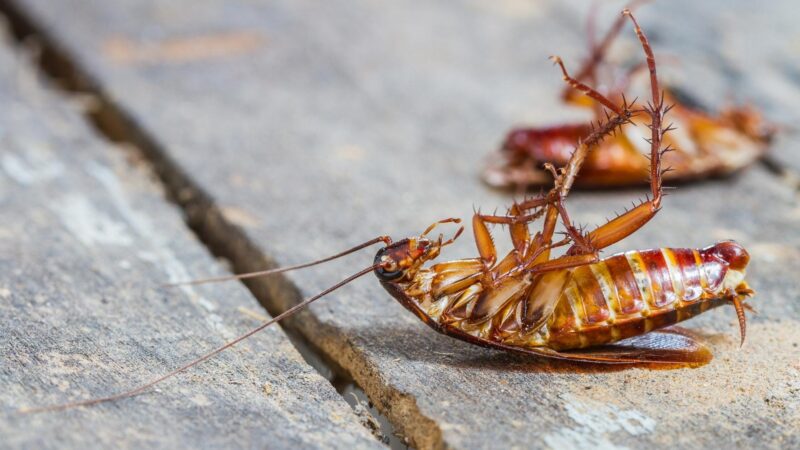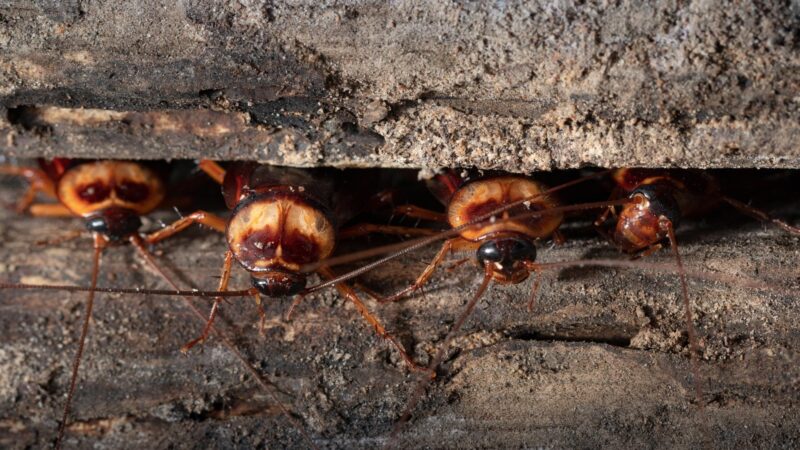Without a doubt, cockroaches are one of the most notorious house pests. Aside from spreading bacteria wherever they are, these disgusting creatures seem to be very difficult to kill.
They can easily run away and hide in the dark. What makes roaches creepier is that they can regrow their legs and live without a head.
A cockroach can live without its head for about a month. This is also the same length of time that they can survive without food. Cockroaches breathe not through their heads but via the tubes inside their bodies. This is why headless roaches can live that long.
Cockroaches have been dubbed as having a higher tolerance for radiation than humans. But then, it does not mean that roaches are immortal or can cheat death. Still, every home can have cockroaches.
So, if you have them in your house, this article can help you understand more about roaches and what can kill them.
Table of Contents
Can a Cockroach Really Survive Without a Head?

Cockroaches can still survive without a head. In fact, they can live headless for about a month. Unlike mammals, roaches don’t have blood pressure on their head.
This means cockroaches don’t lose blood even if their heads are cut off. But once there is a blood clot on their wound, headless roaches may die soon.
Cockroaches don’t need their head to breathe. Instead, these cold-blooded pests breathe through their trachea, a system of tubes attached to the spiracles.
These are small valved openings located on the side of each of their body segment but not on their head. This is the reason why headless cockroaches can still breathe.
What Will Happen if the Head of a Cockroach Is Cut Off?
Headless cockroaches can still live for about a month, especially if the temperature is cold. Nevertheless, they may die earlier once they get infected with molds and bacteria.
Roaches without a head can no longer eat, but they can survive for a month without eating and only a week without drinking.
Interestingly, female roaches can still get pregnant and lay eggs if their heads are cut after mating. This is because the eggs are already fertilized before their heads have been cut.
They also use their heads to produce their reproductive hormone and to release the pheromone that attracts males to mate with them.
On the other hand, females that have lost their heads can no longer mate. This is even after they have attracted males. This is because they cannot accept the male’s invitation to mate.
Meanwhile, headless roaches can also feel irritated and try to escape if they sense danger. Otherwise, they are probably dead.
Can a Cockroach Grow a New Head?

Cockroaches cannot grow a new head. Although roaches can still breathe without a head, they can no longer eat. Hence, headless roaches will eventually die of starvation.
But surprisingly, they have a regeneration ability to regrow their legs. Cockroaches undergo molting, wherein they can replace their lost legs.
Does a Cockroach Have a Brain?
A cockroach has a brain. In fact, cockroaches have two functioning brains that have complex structures. Their main brain (head ganglia) can be found inside their skulls, while the “second brain” is a bundle of nerves that are dubbed abdominal ganglia and thoracic ganglia. In short, it is not a traditional brain.
Cockroaches have almost 1 million brain cells in their head. Their central brain has a mushroom-shaped structure. It dictates communication with nearby roaches, pheromone production, and the ability to regrow body parts.
Their “second “brain” is responsible for several functions such as breathing, mating, flying, and running.
Without their main brain, cockroaches cannot see, find food, eat, drink, distribute hormones, and repair body parts.
Although cockroaches can still live with a head, losing their main brain will not allow them to live normal lives. So, technically speaking, cockroaches still have a conventional brain and cannot live without it.
Why Is the Blood of a Cockroach White?

The blood of a cockroach is white because it lacks hemoglobin, a protein that carries oxygen in the red blood cells. Instead of their bloodstream, roaches use the trachea to distribute oxygen.
This explains why their blood is not red. Note, however, that only males and female cockroach larvae have colorless blood.
On the other hand, adult female cockroaches have slightly orange blood. This blood color is due to a protein called vitellogenin (VTG) that females need to develop embryos.
VTG is produced in the liver of female roaches and is transported to the ovary through the blood. This is why their blood is orange.
Can Cockroaches See You?
Cockroaches can see me, you, and almost everything around them at the same time. They have compound eyes, with more than 2,000 lenses each.
Unlike humans and mammals that have their eyes in front, roach eyes are nearly on the top of the head. This makes cockroaches see almost 360 degrees.
Aside from that, cockroaches also have three simple eyes called ocelli, which can be found on their forehead. With these eyes, they can distinguish light from dark.
Nonetheless, roaches cannot see red colors, so they try to avoid it. This is also why cockroaches prefer hiding in the dark instead of being exposed to the light.
Is It Bad to Squish a Cockroach?

It is bad to squish a cockroach, whether you hit them with your shoe or step on them. But contrary to rumors, killing cockroaches by squishing them will not cause their eggs to spread.
This is because their eggs will also be crushed once you squish them. However, cockroaches can play dead if you hit them very lightly.
The main reason why it is bad to squish cockroaches is that dead roaches release a pheromone.
According to a study, this pheromone smell sends a warning signal to other cockroaches that the place is dangerous and should be avoided. But then, starving cockroaches eat dead roaches if food is scarce.
So, if you feel like killing a cockroach by stepping on it, make sure that it is dead. Then, clean and sanitize the area. Otherwise, other roaches will be attracted to it.
Although this can be a good opportunity to kill them, squishing cockroaches one by one is not an ideal solution against a severe infestation.
Why Are There Suddenly So Many Cockroaches in My House?
Roaches enter any kind of house, whether they are dirty or clean. They also enter houses and buildings to find food, water, and a comfortable shelter.
Therefore, here are among the possible reasons why there are so many cockroaches in your house:
- Your house has tiny openings such as damaged screens on windows and doors, cracks and crevices on walls.
- Cockroaches may also enter houses through sewer lines, poor plumbing, and clogged toilets.
- Your house has lots of sources of moisture. This includes leaky pipes and faucets, damaged toilet tanks, and excess moisture in kitchen and bathroom sinks.
- Your house has clutter everywhere. Roaches love hidden dirty laundry, scattered books, papers, newspapers, and clean clothes on the floor.
- Your house may have dead insects, animal feces, human hair and fingernails, and exposed human food.
- Since cockroaches eat waste, your house may have open garbage cans or uncollected garbage.
Can a Clean House Have Roaches, Too?
A clean house can also have roaches. This is because they are also attracted to moisture. If your house has some small openings, cockroaches will enter, no matter how clean your house is. Once they find sources of food and water, these creepy crawlers will stay and reproduce very quickly.
What Are Cockroaches Scared Of?
Cockroaches have no emotions, which means that they don’t feel fear. In fact, they are not afraid of humans. Instead, they run away and hide when they see us because they get startled by the sudden changes in their surroundings. But then, here are some things that cockroaches hate and avoid as much as possible:
- Roaches hate temperatures below 25°C (75°F) and above 46°C (115° F). They will become inactive at 4°C (40°F).
- Most roach species avoid bright light, but not because they hate light. They prefer dark places to avoid predators.
- Cockroaches hate the smell of essential oils such as eucalyptus, mint, oregano, and rosemary.
- Cockroaches also hate the strong smell of bleach, garlic powder, and ground coffee.
- Sudden loud sounds can repel roaches. This includes sudden clapping, banging of metals, slamming of doors, and stomping of feet.
What Kills Cockroaches Instantly?
Stepping on cockroaches or hitting them with your shoe kills them instantly, but it is not a good idea. Bleach also kills roaches instantly, but some bleach products are not registered as a pesticide. Bleach is also corrosive to metals and can irritate the eyes, skin, and lungs. Aside from that, roaches tend to avoid bleach.
Meanwhile, boiling water kills cockroaches on contact. However, it is very time-consuming and is not applicable in a cockroach infestation. To kill cockroaches instantly, you can use pyrethroid insecticides such as ZOECON Exciter Pyrethrum Solution. For safety purposes, read the product label before using them.
Summary
Killing cockroaches can be very challenging. Some insecticides contain harmful chemicals that can be dangerous to children and pets. Since roaches may still survive if you cut their heads off, hit them hard on their bodies. But then, you must also think of ways to prevent other cockroaches from entering your house.
Related: How to Keep Roaches Away While You Sleep? | A Detailed Guide